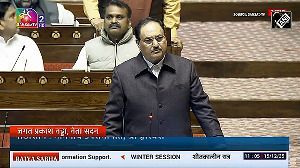The United Nations on Thursday recalled its top envoy to Sri Lanka and closed down an office in Colombo following angry protests against a UN panel which was set up to probe allegations of war crime during the country's civil war.
Secretary General Ban Ki-moon has slammed as "unacceptable" the failure of the Sri Lankan government to facilitate the normal working of the UN offices.
"The Secretary-General finds it unacceptable that the Sri Lankan authorities have failed to prevent the disruption of the normal functioning of the United Nations offices in Colombo as a result of unruly protests organised and led by a cabinet minister of the government," Farhan Haq, associate spokesperson, told journalists.
Ban has recalled the United Nations resident coordinator Neil Buhne to New York for consultations and has also decided to close the United Nations Development Programme (UNDP) regional centre in Colombo.
"The Secretary-General calls upon the government of Sri Lanka to live up to its responsibilities towards the United Nations as host country, so as to ensure continuation of the vital work of the organisation to assist the people of Sri Lanka without any further hindrance," he said.
A senior Sri Lankan minister today began a hunger strike outside the UN office here, demanding that the world body scrap the panel.
Meanwhile, protesters who have been holding demonstrations outside the UN office in the capital calling on world body drop the probe.
The UN maintains that people have the right to protest but it has called on the Sri Lankan government to ensure that the work of the UN is not hampered in the process and all staff members should be able to move about freely in the country.
Despite Colombo's protests, the UN announced in June an panel that will "formulate advice" on dealing with the alleged human rights violations that occurred in the months before the government defeated the LTTE in May 2009.
Following the announcement, the Sri Lankan leadership immediately rejected the panel.
The UN has also made it clear that the panel is not a fact finding or investigative body and that a domestic probe remains the first choice for an investigation.
The panel is expected to produce a report within four months, which will also be made available as a resource to Sri Lanka.
But Sri Lanka asserts that setting up a panel is hampering their domestic investigations, which they claim is being conducted by the recently setup the eight member "Lessons Learnt and Reconciliation Commission" that will report back in six months.
The chair of the panel is Marzuki Darusman, former attorney general of Indonesia who has recently been appointed UN human rights rapporteur for North Korea.
Others on the panel are Yazmin Sooka of South Africa who served on her country's Truth and Reconciliation Commission and Steven Ratner, a lawyer from the United States.




